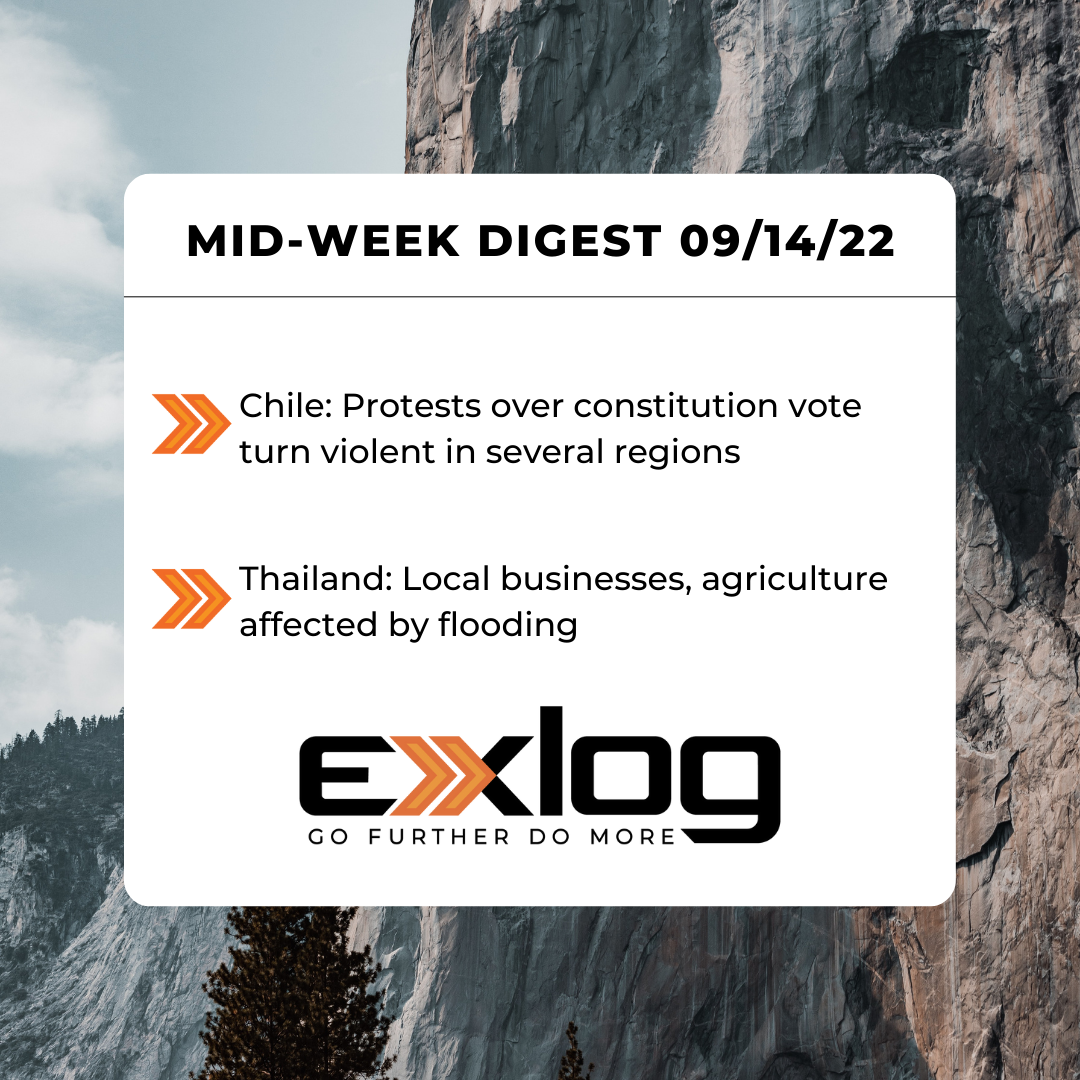unrest over constitution vote in chile and widespread flooding in thailand
Chile: Protests Over Constitution Vote Turn Violent in Several Regions
Student protests over a rejected draft constitution erupted in Santiago and several other Chilean cities on Sept. 6, resulting in significant travel disruptions, looting, and destruction of public and private property. While the demonstrations began peacefully, they escalated into violence within just a few hours, when activists threw blunt objects and Molotov cocktails at police forces in central Santiago. Police responded with water cannons and pepper spray to disperse the crowd; similar clashes between security forces and demonstrators were also reported in Antofagasta and Valdivia. The unrest in the capital was initially concentrated around government buildings and monuments in the downtown area, where protesters set fire to two public buses and looted several businesses. As the protests intensified, however, they spread to other neighborhoods, prompting the closure of several metro stations and traffic disruptions related to police response and roadblocks erected by activists. Police have arrested at least 54 demonstrators in Santiago, although no casualties were reported. In Valdivia, one policeman was shot and injured in clashes with protesters on Sept. 11. The unrest comes as Chilean voters rejected a proposed new constitution in a referendum vote on Sept. 4 and coincided with other demonstrations on Sept. 11 to mark the 49th anniversary of the 1973 coup that brought Augusto Pinochet to power. A majority (61.9%) of Chileans voted against the draft constitution text. The rejection of the text – which was drafted in response to violent nationwide protests over inequality that erupted in 2019 – means that the 154-member Constitutional Assembly must compile a second draft. The government of President Gabriel Boric has not announced a proposed timeline for the process, which will likely take several months. Meanwhile, student groups are likely to continue organizing disruptive protests across the country in the near term; local news outlets reported that students organized protests in central Santiago on Sept. 14, clashing with security forces near the La Moneda metro station and in the Plaza Libertad area.
Thailand: Local Businesses, Agriculture Affected by Flooding
Heavy monsoon rains and swollen rivers have led to extensive flooding across Thailand over the past 10 days, disrupting travel and business operations and prompting the government to issue flash flood alerts in more than 60 provinces in northern, central, and southern Thailand. Satellite imagery shows that the recent heavy rains across the country’s north has flooded 412,462 rai (approx. 163, 000 acres) of land, including 263,057 rai (approx. 104,000 acres) of rice fields, which will likely have a lasting impact on Thai farmers and local economies. In the country’s capital, Bangkok, flooding has interrupted the operations of educational institutions, forcing several universities to temporarily close. Flooding has also affected local businesses, particularly those located along the Chao Phraya River. Bangkok police were deployed to at least 11 districts to assist stranded motorists and transport commuters. The Royal Thai Air Force and navy have sent 20 pusher boats to speed up the drainage of floodwaters and assist with relief efforts in Klaeng district – an area in the southern Rayong province. While the full extent of economic losses remains unclear, local authorities have said that agriculture and domestic tourism experienced the greatest impact; they did not report any significant damage to infrastructure. According to local officials, 20 provinces in the northern, northeastern, and eastern parts of the country remain at risk of flooding until at least Sept. 16, indicating that additional disruptions to domestic travel and business continuity are likely in the coming days.


